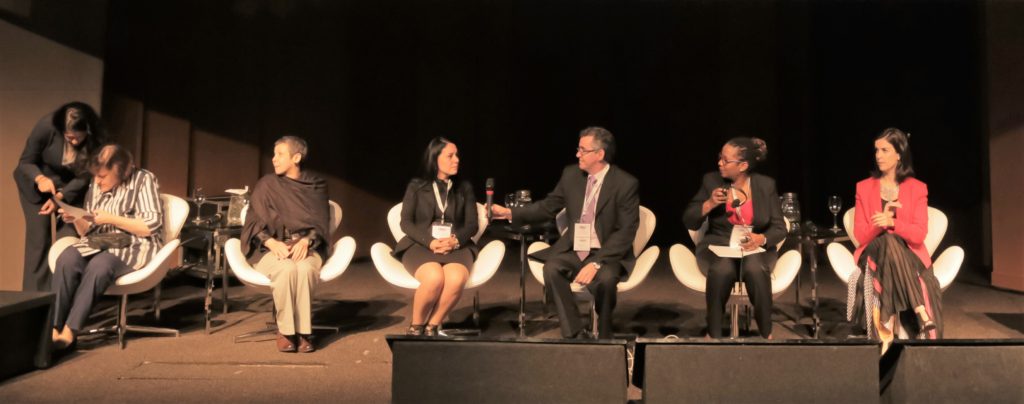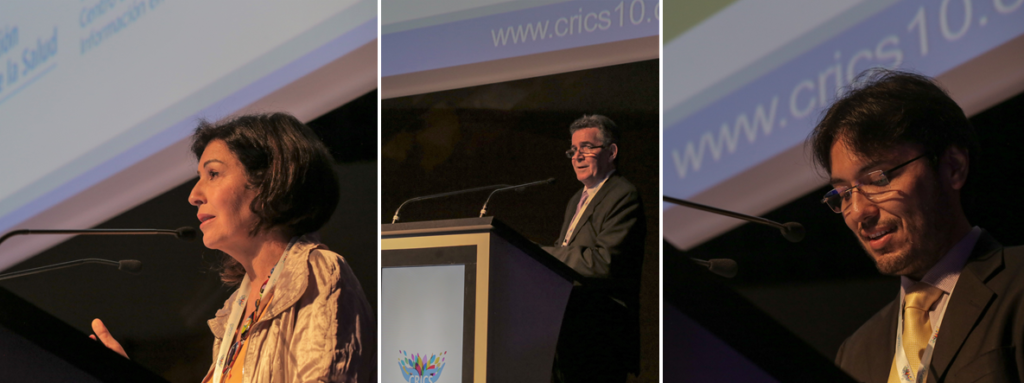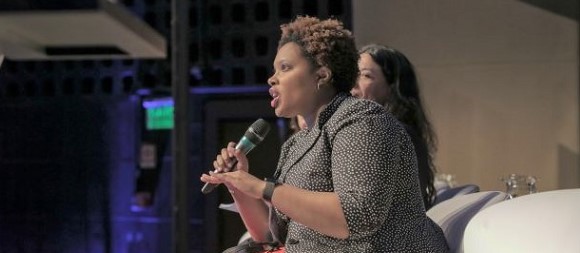The 7th Regional Coordination Meeting of the VHL (VHL7) was held on December 4, 2018, preceding the 10th Regional Congress on Health Sciences Information, CRICS10, in São Paulo, Brazil. “This is a space for exchange and learning, in order to strengthen our joint efforts, a premise for networking”, stated Dr. Diego González, Director of BIREME, during the event’s opening ceremony, while he welcomed every country that make up the VHL Network.
The primary objective of the Meeting, according to Silvia de Valentin, BIREME Manager, was to strengthen national and regional capacities on health sciences information, through technical cooperation and the broadening of collaborative networks.
 The networking model was adopted by BIREME 51 years ago, when it was founded. The Center focuses on knowledge management and information flow, using technology to render available and give access to quality information for different users. According to Verônica Abdala, Manager of Services and Information Sources of BIREE, the VHL Web site had over 32 million views in 2018, and the numbers tend to increase. Abdala points out that despite de large volume of health information produced in Latin America and the Caribbean, it is essential to present it in way that is closer to the users’ reality, thus guaranteeing its visibility and usability. “We must value the knowledge generated by our countries”, she sustains.
The networking model was adopted by BIREME 51 years ago, when it was founded. The Center focuses on knowledge management and information flow, using technology to render available and give access to quality information for different users. According to Verônica Abdala, Manager of Services and Information Sources of BIREE, the VHL Web site had over 32 million views in 2018, and the numbers tend to increase. Abdala points out that despite de large volume of health information produced in Latin America and the Caribbean, it is essential to present it in way that is closer to the users’ reality, thus guaranteeing its visibility and usability. “We must value the knowledge generated by our countries”, she sustains.
 The topic of equity, central to the 2030 Agenda, was present in many conferences held during VHL7. Renato Murasaki, Information Methodology and Technology Manager of BIREME, recalls that the current technological immersion, where a large part of interactions are mediated by machines, digital inequity affects opportunities to rights and equality. “Equity is an institutional value for BIREME; it is present in the development of the information products and services of the Center”, he ensured.
The topic of equity, central to the 2030 Agenda, was present in many conferences held during VHL7. Renato Murasaki, Information Methodology and Technology Manager of BIREME, recalls that the current technological immersion, where a large part of interactions are mediated by machines, digital inequity affects opportunities to rights and equality. “Equity is an institutional value for BIREME; it is present in the development of the information products and services of the Center”, he ensured.
Ian Roberts, from the Library and Information Networks for Knowledge of the World Health Organization (WHO), presented the strategic focus of the WHO for the global integration of health information networks, whilst recognizing the importance of the VHL as a source of inspiration for the creation of the Global Index Medicus (GIM). “We are happy and proud of bringing forward collections of scientific literature created nationally, often in very specific contexts, giving them visibility through the VHL”, he noted.
 The leadership of the Region in knowledge management in health was also praised by Eliane Pereira dos Santos, Knowledge Management and Publications Advisor of PAHO/WHO. According to Santos, the 2012 approval by PAHO Member-States of the Strategy and Plan of Action, in force from 2013 to 2018, made the Americas the first Region of the WHO to establish a specific structure for fostering actions on knowledge management, information access and communication in health. “[The document] consolidated the Americas as a pioneer Region in implementing new paradigms related to the generation, circulation, preservation and dissemination of public health information”, stated Santos.
The leadership of the Region in knowledge management in health was also praised by Eliane Pereira dos Santos, Knowledge Management and Publications Advisor of PAHO/WHO. According to Santos, the 2012 approval by PAHO Member-States of the Strategy and Plan of Action, in force from 2013 to 2018, made the Americas the first Region of the WHO to establish a specific structure for fostering actions on knowledge management, information access and communication in health. “[The document] consolidated the Americas as a pioneer Region in implementing new paradigms related to the generation, circulation, preservation and dissemination of public health information”, stated Santos.
 A VHL7 master conference was held by Amanda Wilson, from the National Library of Medicine (NLM) of the United States, entitled “Building collaborative networks: the perspective of health and transport sectors”. Fifteen other conferences were organized in round tables, addressing the strengthening of networks for increasing the impact of the VHL; networking in local, regional and international spheres; and the exchange of experiences and better practices by VHL regional networks.
A VHL7 master conference was held by Amanda Wilson, from the National Library of Medicine (NLM) of the United States, entitled “Building collaborative networks: the perspective of health and transport sectors”. Fifteen other conferences were organized in round tables, addressing the strengthening of networks for increasing the impact of the VHL; networking in local, regional and international spheres; and the exchange of experiences and better practices by VHL regional networks.
During the closing ceremony, recommendations from the three satellite events related to VHL7 were read, and a speech was delivered by the PAHO Director, Dr. Carissa Etienne, who acknowledged the commitment and dedication shown by the VHL Network throughout the years, in favor of the development of health in the Region. Dr. Etienne recognized the importance of the information contained in the VHL, which serves a bread audience of researchers, academics and students, among others. “We are in a time of information revolution, a time of innovation that will take us all over the winning mark. Thank you for your generosity and thank you continuing to hold in your heart to help the people of this region the achievement of development”, stated Dr. Etienne.
Finally, the São Paulo Declaration for the Democratization of Scientific Knowledge to Achieve the Goals of Sustainable Development was read.